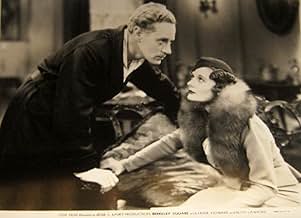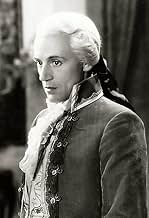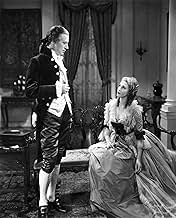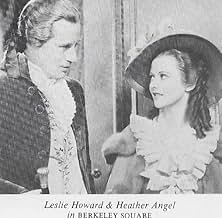IMDb RATING
6.5/10
1.1K
YOUR RATING
A young American man comes to believe that he can will himself back to London in the time of the American Revolution and meet his ancestors, who lived in the house he has just inherited.A young American man comes to believe that he can will himself back to London in the time of the American Revolution and meet his ancestors, who lived in the house he has just inherited.A young American man comes to believe that he can will himself back to London in the time of the American Revolution and meet his ancestors, who lived in the house he has just inherited.
- Director
- Writers
- Stars
- Nominated for 1 Oscar
- 4 wins & 2 nominations total
Samuel S. Hinds
- The American Ambassador
- (as Samuel Hinds)
Lionel Belmore
- Innkeeper
- (uncredited)
Tom Ricketts
- Town Crier
- (uncredited)
Hylda Tyson
- Maid
- (uncredited)
- Director
- Writers
- All cast & crew
- Production, box office & more at IMDbPro
6.51K
1
2
3
4
5
6
7
8
9
10
Featured reviews
Creaky Yet Strangely Haunting Version of a Theatrical Classic
BERKELEY SQUARE was a success d'estime of the late Twenties and early Thirties. Based on a short story - THE SENSE OF THE PAST - by Henry James, it tells the story of how Peter Standish (Leslie Howard) travels back in time from the contemporary world into the late eighteenth century, and discovers to his cost that life isn't quite as idyllic as the history books might suggest. John L. Balderston's script isn't without its sentimental moments, but generally takes a hard-nosed look at the ways in which individuals remain as self-centered in the past as they might have been over a century ago. Leslie Howard, who created the past of Standish on the Broadway stage, here recreates his part; he doesn't have to do much other than to look bewildered, which he achieves very competently. Valerie Taylor makes an ideal romantic interest. Director Frank Lloyd was one of Twentieth Century-Fox's most competent contract directors; his version of Noel Coward's CAVALCADE (1933), based on another theatrical hit, is particularly memorable. In BERKELEY SQUARE he creates a brisk narrative, containing a memorable series of transitions between past and present. Definitely worth a look if a copy of the film can be found.
Fine film which is hard to find
This is a very amusing love story with a good dash of humor. Much of the humor centers around the culture clash between Standish and the 18th century family. Standish uses modern terms and slips when he reveals things that happen in the future. The culture clash is a cautionary tale for would be travelers. This film appealed to many women because Leslie Howard was a heart throb for many of them. My mother loved this film and could watch it over and over. She was so disappointed when late in her life it disappeared from the old movies shown on TV.
It is currently not commercially available, but a number of vendors have poor quality CDs or tapes for sale. All of these were probably made from a VHS tape from a TV showing. The tape was deteriorated and possibly copied several times so there is a lot of instability and wiggling of the image. The original broadcast used extreme compression of the video and sound. As a result the noise level rises to become very loud until dialog causes the gain to be cut. As a result the dialog is sometimes very indistinct. The music which was originally soft also rises to match the level of the dialog. Once this is restored by hand, the film is fairly listenable. The complaint of another reviewer about the music being too loud may stem from watching a copy with similarly compressed sound. In addition the broadcast severely cropped the film and did not stabilize the jitter.
This is a film that deserves restoration from the existing prints, but when and if this happens is unknown. Until then buying one of the existing CDs may be the only way to view this fine film.
It is currently not commercially available, but a number of vendors have poor quality CDs or tapes for sale. All of these were probably made from a VHS tape from a TV showing. The tape was deteriorated and possibly copied several times so there is a lot of instability and wiggling of the image. The original broadcast used extreme compression of the video and sound. As a result the noise level rises to become very loud until dialog causes the gain to be cut. As a result the dialog is sometimes very indistinct. The music which was originally soft also rises to match the level of the dialog. Once this is restored by hand, the film is fairly listenable. The complaint of another reviewer about the music being too loud may stem from watching a copy with similarly compressed sound. In addition the broadcast severely cropped the film and did not stabilize the jitter.
This is a film that deserves restoration from the existing prints, but when and if this happens is unknown. Until then buying one of the existing CDs may be the only way to view this fine film.
A Past to Look Forward To
Leslie Howard received his first Oscar nomination in this lovely film adaptation of the play he starred in in London and on Broadway. He plays a current-day (1933) American man who yearns for the peace and quiet and beauty of the 18th century after he discovers some old papers and diaries in his ancestral house. He wishes so hard he is actually transported to 1784.
Right off the bat, he gets into trouble fitting into the rhythm and manners of 18th Century London ... and into the lives of his ancestors. The mother (Irene Browne) is trying to marry off two daughters (Heather Angel, Valerie Taylor) to men with money, one of whom is Howard's ancestor whose body he is now inhabiting.
Knowing that he must not change history, he walks a tightrope. He is not attracted to the woman his ancestor marries, but he is attracted to her sister. But history dictates he must not marry her. He also keeps dropping words and phrases that make no sense in 1784, and he scares people by when he blurts out bits of information about things that have not yet happened.
As he digs himself into a bigger hole every day, he realizes that the woman he really loves (Angel) seems to shares his discontent for the age in which she is trapped. She longs for the future! Yet in one horrific moment, she sees the future world in his eyes and it scares her. For his part, he finally has to admit that the 18th Century is utterly horrible and that it actually stinks! People don't bathe; the streets are full of horse manure.
Leslie Howard is superb as the man torn between the past and his own time. He and Heather Angel make for a terrifically doomed couple, and the scene when he returns (in 1933) from her grave and read the epitaph carved into her headstone is quite moving.
Co-stars include Juliette Compton as an arch and wily duchess, Alan Mowbray as Clinton, Ferdinand Gottschalk as the aged suitor, Betty Lawford as the current-day girlfriend, Beryl Mercer as the housekeeper, and Samuel S. Hinds as Adams.
Right off the bat, he gets into trouble fitting into the rhythm and manners of 18th Century London ... and into the lives of his ancestors. The mother (Irene Browne) is trying to marry off two daughters (Heather Angel, Valerie Taylor) to men with money, one of whom is Howard's ancestor whose body he is now inhabiting.
Knowing that he must not change history, he walks a tightrope. He is not attracted to the woman his ancestor marries, but he is attracted to her sister. But history dictates he must not marry her. He also keeps dropping words and phrases that make no sense in 1784, and he scares people by when he blurts out bits of information about things that have not yet happened.
As he digs himself into a bigger hole every day, he realizes that the woman he really loves (Angel) seems to shares his discontent for the age in which she is trapped. She longs for the future! Yet in one horrific moment, she sees the future world in his eyes and it scares her. For his part, he finally has to admit that the 18th Century is utterly horrible and that it actually stinks! People don't bathe; the streets are full of horse manure.
Leslie Howard is superb as the man torn between the past and his own time. He and Heather Angel make for a terrifically doomed couple, and the scene when he returns (in 1933) from her grave and read the epitaph carved into her headstone is quite moving.
Co-stars include Juliette Compton as an arch and wily duchess, Alan Mowbray as Clinton, Ferdinand Gottschalk as the aged suitor, Betty Lawford as the current-day girlfriend, Beryl Mercer as the housekeeper, and Samuel S. Hinds as Adams.
They're not all that reasonable in the age of reason
Although this version of Berkeley Square was little more than a photographed stage play it does have Leslie Howard portraying Peter Standish as he did on Broadway for 229 performances during the 1929-1930 season. No other member of the cast repeated their roles. I have to say that the Tyrone Power version from 1951 was and is more cinematically viable.
That being said Leslie Howard was doing a part that was tailor made for him. He's a jaded American scientist who is firmly convinced that he is at some point in time destined to change places with an ancestor also named Peter Standish from the 18th century post American Revolution Great Britain.
When he gets there he mixes and mingles with high and mighty of the day like the Prince Of Wales, Dr. Samuel Johnson, and Sir Joshua Reynolds. And he knows things that others don't and uses all kinds of modern in this case 1928 idioms that first amuse then frighten.
He's in fact pledged to one woman, but falls in love with her sister played by Heather Angel, something he did not count on. It's almost like a trip to Fantasy Island where Mr. Rourke has arranged a trip to the Age of Reason. Usually those trips to some idealized place in history involved a cruel dose of reality as well and in Berkeley Square Leslie Howard gets just such a dose.
Howard and Angel are a wonderfully matched pair of lovers who will meet some day in time and space and know it. Howard earned his first Oscar nomination for Best Actor, the second coming with Pygmalion. Had Berkeley Square been better cinematically it probably would be more revived. As it is it's a great performance by Leslie Howard, one his legion of fans should treasure.
That being said Leslie Howard was doing a part that was tailor made for him. He's a jaded American scientist who is firmly convinced that he is at some point in time destined to change places with an ancestor also named Peter Standish from the 18th century post American Revolution Great Britain.
When he gets there he mixes and mingles with high and mighty of the day like the Prince Of Wales, Dr. Samuel Johnson, and Sir Joshua Reynolds. And he knows things that others don't and uses all kinds of modern in this case 1928 idioms that first amuse then frighten.
He's in fact pledged to one woman, but falls in love with her sister played by Heather Angel, something he did not count on. It's almost like a trip to Fantasy Island where Mr. Rourke has arranged a trip to the Age of Reason. Usually those trips to some idealized place in history involved a cruel dose of reality as well and in Berkeley Square Leslie Howard gets just such a dose.
Howard and Angel are a wonderfully matched pair of lovers who will meet some day in time and space and know it. Howard earned his first Oscar nomination for Best Actor, the second coming with Pygmalion. Had Berkeley Square been better cinematically it probably would be more revived. As it is it's a great performance by Leslie Howard, one his legion of fans should treasure.
Through the Past, Darkly
How many of us have wished that we might escape from the dull reality of the present into the glamor and romance of yesterday? But if we could journey back into the mystery of the past, should we find contentment - or unhappiness?"
On a stormy night in 1784, new American noble Leslie Howard (as Peter Standish) arrives in London's "Berkeley Square" to seek a distant cousin's hand in marriage. After exiting his coach, Mr. Howard seems to vanish. Meanwhile, in the present (1933), his direct descendant and namesake "Peter Standish" (Howard, in a dual role) has inherited the same house. The modern Howard troubles his fiancée and friends due to his preoccupation with the past, especially the September 1784 day when his namesake arrived. Transported to the past, Howard invites suspicion when his "modern" manners and knowledge surface. Howard talks too much. More significantly, he becomes attracted to the wrong woman, beautiful but melancholy Heather Angel (as Helen Pettigrew)...
This intriguing "time travel" film was unavailable for decades, but the story was revived often on stage and screen. It was based on an unfinished Henry James novel and inspired memorable imitations from horror mythos-makers H. P. Lovecraft ("The Shadow out of Time") and Dan Curtis ("Dark Shadows"). Howard recreates his performance from the stage well, but director Frank Lloyd and Fox don't take full advantage of cinema potential. Early examples are Howard's trip to the past. He could have appeared outside the door, wet, as both arrivals occurred in the rain. Howard also immediately knows how to sit in his 1784 costume, betraying a familiar comfort. Later, the film would have benefited from Howard visiting the actual grave mentioned in a letter...
Solid impressions are made by lustful Colin Keith-Johnston (as Thomas "Tom" Pettigrew) and sensible sister Valerie Taylor (as Kate). Matriarchal Irene Browne (as Ann) played her role again in the 1941 re-make starring Tyrone Power.
******* Berkeley Square (9/15/33) Frank Lloyd ~ Leslie Howard, Heather Angel, Colin Keith-Johnston, Valerie Taylor
On a stormy night in 1784, new American noble Leslie Howard (as Peter Standish) arrives in London's "Berkeley Square" to seek a distant cousin's hand in marriage. After exiting his coach, Mr. Howard seems to vanish. Meanwhile, in the present (1933), his direct descendant and namesake "Peter Standish" (Howard, in a dual role) has inherited the same house. The modern Howard troubles his fiancée and friends due to his preoccupation with the past, especially the September 1784 day when his namesake arrived. Transported to the past, Howard invites suspicion when his "modern" manners and knowledge surface. Howard talks too much. More significantly, he becomes attracted to the wrong woman, beautiful but melancholy Heather Angel (as Helen Pettigrew)...
This intriguing "time travel" film was unavailable for decades, but the story was revived often on stage and screen. It was based on an unfinished Henry James novel and inspired memorable imitations from horror mythos-makers H. P. Lovecraft ("The Shadow out of Time") and Dan Curtis ("Dark Shadows"). Howard recreates his performance from the stage well, but director Frank Lloyd and Fox don't take full advantage of cinema potential. Early examples are Howard's trip to the past. He could have appeared outside the door, wet, as both arrivals occurred in the rain. Howard also immediately knows how to sit in his 1784 costume, betraying a familiar comfort. Later, the film would have benefited from Howard visiting the actual grave mentioned in a letter...
Solid impressions are made by lustful Colin Keith-Johnston (as Thomas "Tom" Pettigrew) and sensible sister Valerie Taylor (as Kate). Matriarchal Irene Browne (as Ann) played her role again in the 1941 re-make starring Tyrone Power.
******* Berkeley Square (9/15/33) Frank Lloyd ~ Leslie Howard, Heather Angel, Colin Keith-Johnston, Valerie Taylor
Did you know
- TriviaS.T. Joshi points to this film as an inspiration for H.P. Lovecraft's novel "The Shadow Out of Time": "Lovecraft saw this film four times in late 1933; its portrayal of a man of the 20th century who somehow merges his personality with that of his 18th-century ancestor was clearly something that fired Lovecraft's imagination, since he had written a story on this very theme himself--the then unpublished "The Case of Charles Dexter Ward" (1927)." Lovecraft called the film "the most weirdly perfect embodiment of my own moods and pseudo-memories that I have ever seen--for all my life I have felt as if I might wake up out of this dream of an idiotic Victorian age and insane jazz age into the sane reality of 1760 or 1770 or 1780." Lovecraft noted some conceptual problems in this film's depiction of time travel, and felt that he had "eliminated these flaws in his masterful novella of mind-exchange over time."
- GoofsThe word Okay (OK) was not used in the 18th century.
- Quotes
Tom Pettigrew: [to his sister, after being caught kissing the maid] You all look alike in the dark.
- ConnectionsReferenced in Don't Bet on Blondes (1935)
- SoundtracksEarly One Morning
(uncredited)
English folk song
- How long is Berkeley Square?Powered by Alexa
Details
- Release date
- Country of origin
- Language
- Also known as
- La plaza de Berkeley
- Production company
- See more company credits at IMDbPro
- Runtime
- 1h 28m(88 min)
- Color
- Aspect ratio
- 1.37 : 1
Contribute to this page
Suggest an edit or add missing content

































